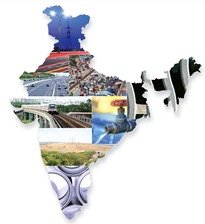| 0 Comments |

The remarkable progress of India, compared to comparable nations, recognizes it as one of the fastest-growing major emerging markets. India's exceptional economic expansion, driven by crucial advancements in digitization and infrastructure, establishes it as a prominent global contributor. India is actively endeavoring to improve its manufacturing competitiveness. The footpath to sustainable development and a competitive manufacturing sector for India requires a robust and trustworthy national infrastructure, particularly in power generation and transportation. India's aspirations to maintain its comparatively strong growth depend on infrastructure, a critical growth factor.
Infrastructure development plays a vital role in elevating India's manufacturing competitiveness and opening the potential for increased economic growth. The Indian economy has experienced a strong recovery from the pandemic, emerging as a significant motivation for global growth. Employment has exceeded pre-pandemic levels, mainly driven by the informal sector, even as efforts toward formalization continue. Despite funding being accessible for economically feasible ventures, timely completion of the projects within budget remains a critical challenge.
Efficient infrastructure development has the potential to stimulate growth across various sectors such as cement, steel, real estate, automotive, and beyond. Although there are refinements in power generation and transmission, constraints continue to hamper transportation infrastructure capacity, and corporate performance and investment opportunities have been restricted.
India requires a strong dedication to advancing its infrastructure. It is a duty that requires flexible policies and proficient management for timely implementation on a remarkable magnitude. Political stability is necessary for investment and growth, emphasizing the significance of transparent and predictable business surroundings. While acknowledging the government's initiatives to enhance the business environment, such as the single national window, further simplification is essential. Through collaborations with private organizations, the Indian government aims to utilize expertise and resources to enable sustainable development.
Identifying the significant role of infrastructure in driving economic growth, the Indian government has ventured into ambitious schemes and policies. In terms of India, the statement holds. India is a nation representing rapid population growth and varied geographic terrain. The significance of infrastructure development plays an important role in molding a nation's economic trajectory. Robust infrastructure serves as the foundation for economic advancement and is essential. Whether it is transportation networks, digital connectivity, or energy grids, infrastructure advancement lays the foundation for sustainable progress and prosperity. Programs such as the National Infrastructure Pipeline have been introduced to ramp up investment in essential sectors and expedite project execution.
Infrastructure development is intricately linked with the growth of industries. Enhancing infrastructure cuts down costs, enhances efficiency, attracts investments, and flares economic activity. Providing reliable access to transportation, energy, and digital connectivity is essential for businesses to thrive.
India's extensive network of roads, railways, airways, and waterways serves to bridge remote regions with urban hubs, facilitating uninterrupted trade. The smooth movement of goods and people requires the expertise of professional transportation infrastructure construction firms.
India's energy sector has experienced significant expansion in recent times, particularly highlighting the adoption of renewable energy sources and rural electrification. Energy infrastructure is the backbone of modern economies, supplying power to industries, residences, and other required services.
Initiatives focused on smart cities and urban revitalization aim to create sustainable and enjoyable urban environments. The fast growth of urban areas requires powerful urban infrastructure to acclimate growing populations and deliver essential services.
In the modern digital era, connectivity has transitioned from luxury to an essential requirement. Digital infrastructure, containing data centers, broadband networks, and electronic governance platforms, plays a critical role in enabling innovation and easing access to vital information and services.
With fast technological advancement and consumer preferences growing, there arises a need for infrastructure solutions that are versatile and enduring. The evolution of infrastructure development in India shows commitment and challenge. This involves meeting the evolving needs of society while ensuring long-term viability and stability amidst dynamic conditions.
Infrastructure development can be considered a fundamental pillar of India's economic growth. Through strategic investments in cutting-edge infrastructure and associations between the public and private sectors, India can unlock its vast potential and demonstrate itself as the ultimate strength in the global economy. This involves enhancing physical infrastructure like energy systems and transportation networks, adopting digital infrastructure, and encouraging innovation to propel productivity and competitiveness on an international scale. By leveraging these actions, India can position itself as an economic powerhouse, drawing investment, fostering job creation, and enhancing the overall quality of life for its nationals.

(0) comments for "The Crucial Role of Infrastructure Development in India's Economic Growth and Global Competitiveness"
Leave a Reply